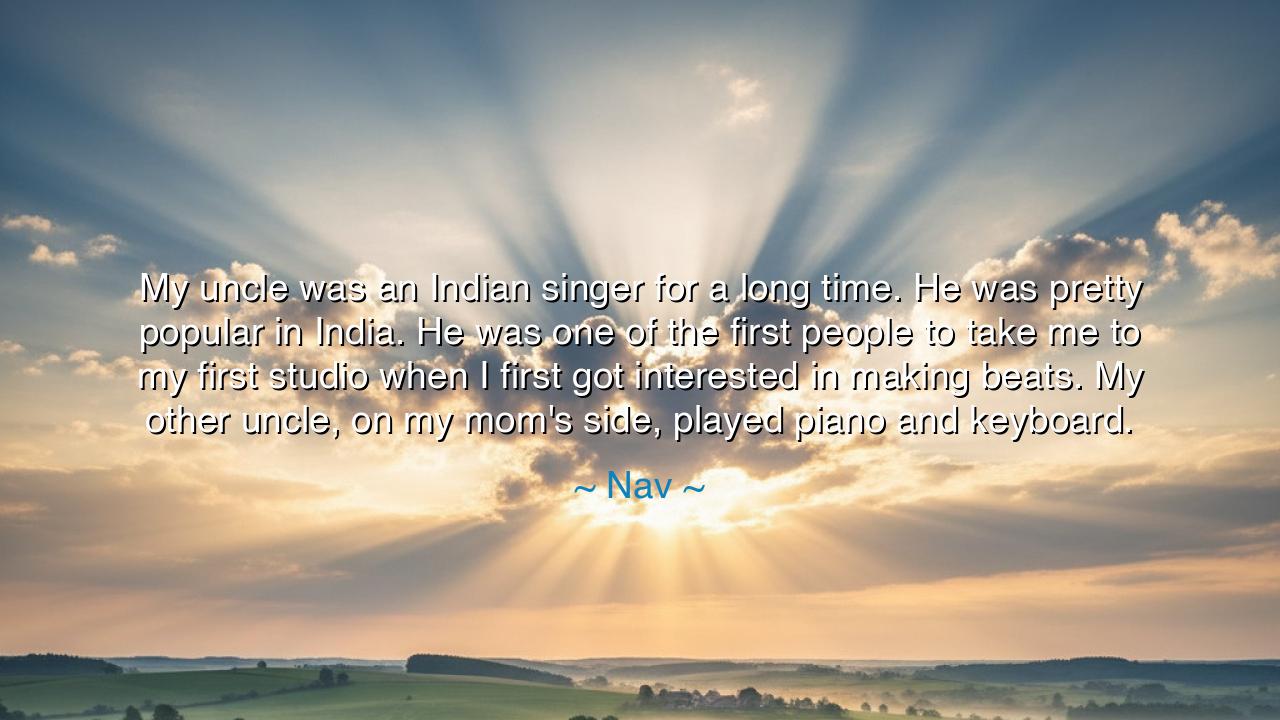
My uncle was an Indian singer for a long time. He was pretty
My uncle was an Indian singer for a long time. He was pretty popular in India. He was one of the first people to take me to my first studio when I first got interested in making beats. My other uncle, on my mom's side, played piano and keyboard.






“My uncle was an Indian singer for a long time. He was pretty popular in India. He was one of the first people to take me to my first studio when I first got interested in making beats. My other uncle, on my mom’s side, played piano and keyboard.” — Nav
In these humble, reflective words, Nav — the Canadian rapper, producer, and artist — reveals the roots of his musical lineage, the sacred beginning of his journey into sound. Beneath this simple memory lies a deep truth that the ancients understood well: that creativity is an inheritance, passed like a torch from one generation to the next. When Nav remembers his uncles, one a singer and the other a musician, he is tracing the thread of his destiny back to its origin — the moment when art first called to him, not as a career, but as a calling.
To the ancients, such a lineage was not chance, but providence. The Greeks would have said that the Muses themselves favor certain families, breathing into their blood the rhythm of creation. Just as the house of Homer gave birth to poets, or the family of Bach carried the gift of music through generations, so too did Nav inherit the echo of melody from those who came before him. His uncle’s voice, known to many in India, was not only a sound of fame but the seed of inspiration, planted in a young boy’s heart who would one day carry that rhythm into a new world, blending East and West, past and future.
When he recalls that his uncle took him to his first studio, it is a sacred initiation — the moment the apprentice enters the temple. To step into a recording studio for the first time is, for a musician, like standing at the edge of creation itself. The ancients would compare it to the young sculptor first touching marble or the poet holding a blank scroll: a confrontation with infinity. In that small room filled with wires and instruments, Nav first glimpsed the power of art — to turn silence into beauty, thought into sound. His uncle was not merely a relative, but a mentor, a guide, the keeper of the flame.
His other uncle, the pianist and keyboardist, completes the picture — showing that music was not a passing interest, but the very air of his upbringing. The piano, with its ordered keys, represents discipline and harmony, while the studio represents freedom and innovation. Together, they shaped him into what the ancients would call a balanced artist — one who honors the structure of craft even as he breaks new ground. This duality — of form and freedom — is what has always defined great creators. Just as Orpheus combined divine inspiration with human skill, Nav’s art, born from family influence, unites heritage with originality.
The origin of his quote lies in gratitude — the acknowledgment that genius is never solitary. Every artist, every thinker, every leader stands upon the shoulders of those who came before. The ancients knew this truth well: the apprentice honors the master, not to remain in his shadow, but to extend his light. Nav’s uncles gave him more than guidance; they gave him permission to dream, to see music not as fantasy but as legacy. Their faith in him became the soil from which his art grew.
There is a story from the East of a young tabla player who asked his teacher how he might play like the great masters. The teacher replied, “Do not seek to play as they played. Seek what they sought.” This is the essence of Nav’s journey. His uncles’ music was not meant to be copied, but continued — transformed through time, carried into new lands and new generations. In honoring them, Nav honors the eternal cycle of creation: each artist becomes both student and ancestor in turn.
Let this, then, be the lesson for all who hear: never forget the hands that opened the door for you. Your talents are not accidents; they are inheritances. Cherish your mentors, your elders, your teachers, and those who first saw the spark in you. Seek them out. Learn from them. And when the time comes, pass that spark to another. The ancients said, “A lamp loses nothing by lighting another.” So, too, do we fulfill our purpose when we share the gifts that were once shared with us.
For as Nav reminds us through his quiet remembrance, greatness is not born in isolation. It is born in lineage, in gratitude, and in love. The studio, the stage, the song — all are sacred echoes of those early voices. And when we listen closely, we can still hear them — the music of our ancestors, playing softly beneath our own.






AAdministratorAdministrator
Welcome, honored guests. Please leave a comment, we will respond soon